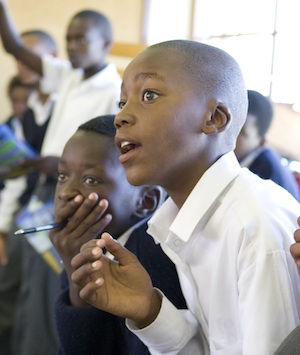Ever wonder how Grassroot Soccer comes up with our activities and lessons, and how we know if they’re effective? What about adapting the lessons to specific cultures, genders and ages? Here’s a quick overview of what goes in to creating a new curriculum:
RESEARCH: We review existing data from within GRS, the latest literature in the public health, education, and development fields, and we reach out to experts. For example, for Make the Cut we collaborated with researchers who have conducted circumcision uptake trials in Africa.
LOGIC MODEL: We create a logic model to guide the creation of the curriculum and evaluation and present a visual representation of all the intended inputs, outputs and outcomes. This model is informed throughout the development process based on feedback information.
CURRICULUM DEVELOPMENT WORKSHOP: These workshops allow all stakeholders an opportunity to shape the curriculum and generate buy-in at the site level. Stakeholders include GRS staff, external researchers, GRS Coaches, community members, partner organizations and GRS participants.
PRE-TEST: GRS tries out the new activity or publication with a small group of youth and coaches, and gathers qualitative feedback through interviews and observations.
PILOT: This is a step beyond a pre-test and is a more formal study that looks at key indicators, and involves a large enough group of participants to be significant.
Throughout this process, our curriculum development team is continually gathering feedback from our coaches, our participants, and our staff on what’s working in the field and what could improve. The result is a curriculum that is culturally relevant and informed by the latest evidence of what works in prevention, testing and treatment.
